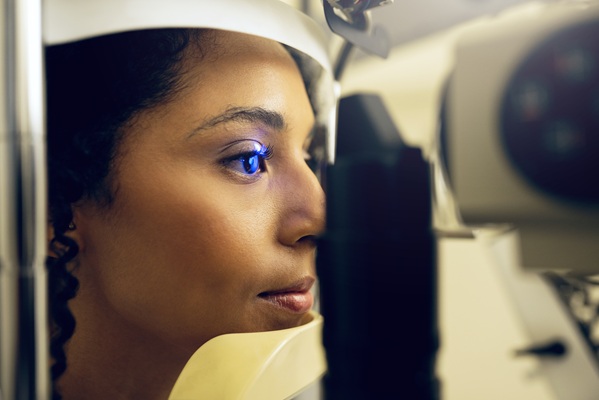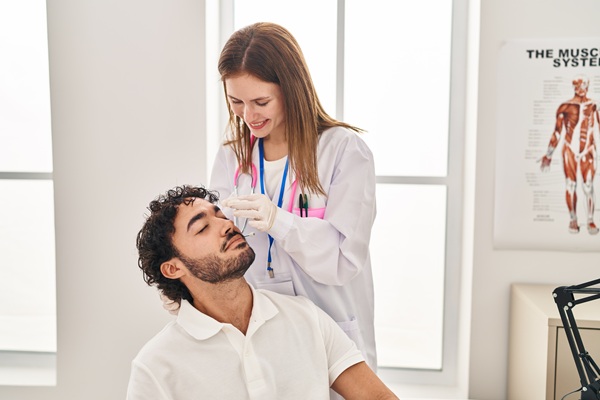What to Expect During a Diabetic Eye Exam and Why You Need It

For those living with diabetes, undergoing a diabetic eye exam is one of the most important steps in protecting their vision and overall eye health. High blood sugar levels can lead to a range of complications, including conditions that damage the eyes over time. These exams help detect these issues before they become serious, allowing for early treatment and better long-term outcomes.
What happens during a diabetic eye exam?
A diabetic eye exam thoroughly assesses the eyes' health for signs of diabetes-related complications. It typically begins with a discussion about overall health, including diabetes management and any recent changes in vision. This conversation helps determine any immediate concerns and guides the next steps of the evaluation.
One of the first tests an optometrist will perform is a visual acuity assessment, which checks how each eye clearly can see at different distances. This helps identify vision changes that may be related to diabetes or other factors. The optometrist may also include a refraction test to determine if an updated prescription for glasses or contact lenses is necessary.
The optometrist examines the structure at the front of the eye using a slit lamp., a specialized microscope that provides a close-up view of the cornea, iris, and lens. This step helps identify any early signs of cataracts or other conditions that could impact vision over time.
How pupil dilation helps with early detection
One of the most important parts of a diabetic eye exam is pupil dilation. The optometrist will place special drops to widen the pupils, allowing for a more detailed view of the retina and optic nerve. This step is essential for detecting early signs of diabetic retinopathy, macular edema, and other conditions that may not be visible through standard testing.
Although the effects of pupil dilation are temporary, it is common to experience increased sensitivity to light and mild blurriness for a few hours after the exam. Bringing sunglasses can help reduce discomfort when leaving the appointment. While this process may seem inconvenient, it plays a vital role in identifying concerns before they cause significant vision loss.
What conditions can a diabetic eye exam detect?
A diabetic eye exam is especially useful in detecting diabetic retinopathy, a condition caused by damage to the small blood vessels in the retina. As this condition progresses, it can lead to vision impairment or blindness if left untreated. Early detection allows for timely intervention, helping to slow or prevent further damage.
Another common issue is diabetic macular edema, which occurs when fluid builds up in the macula, the part of the eye responsible for sharp central vision. This condition can make reading, driving, or recognizing faces difficult, but treatment options are available to manage it effectively.
People with diabetes are also at a higher risk of developing glaucoma, a condition that increases pressure inside the eye and can damage the optic nerve. Cataracts, another potential concern, cause clouding of the eye's lens. An optometrist can identify these conditions early to recommend appropriate treatments to protect long-term vision.
What happens after a diabetic eye exam?
Once the exam is complete, the optometrist will review the findings and discuss any necessary next steps. If early signs of a diabetic-related eye condition are present, they will recommend a personalized treatment plan. In some cases, this may include closer monitoring, medication, or laser treatments to prevent further progression.
For individuals who do not show signs of eye disease, the focus shifts to prevention and continued monitoring. Keeping blood sugar levels stable, following a balanced diet, and managing overall health are key factors in reducing the risk of developing vision problems in the future. Regular follow-up exams ensure that the optometrist detects any changes early and addresses them promptly.
The frequency of diabetic eye exams depends on individual health and risk factors. Nevertheless, according to the U.S. Department of Health and Human Services, many people with diabetes benefit from annual eye exams, while others with existing eye conditions may need more frequent visits. Regardless, the optometrist will develop a personalized plan based on how well the patient is caring for their diabetes, along with the help of their primary medical providers.
Take an active role in your eye health
A diabetic eye exam is a crucial step in maintaining long-term vision and preventing complications related to diabetes. By catching potential issues early, you can take proactive measures to protect their eyesight and overall well-being. If you have diabetes or prediabetes and are ready to take an active role in your eye health, contact Texas Optical and schedule an appointment.
Request an appointment here: https://www.texasoptical.net or call Texas Optical at (214) 771-7333 for an appointment in our Dallas office.
Check out what others are saying about our services on Yelp: Read our Yelp reviews.
Recent Posts
Dry eye treatment is important when occasional irritation becomes ongoing discomfort that interferes with daily activities. Many individuals experience dryness, burning, or a gritty feeling in the eyes from time to time. However, when symptoms start to affect reading, screen use, or time outdoors, a structured approach to diagnosis and care helps protect comfort and…
Myopia control focuses on slowing the progression of nearsightedness, primarily in children and teens, to help protect long-term eye health and day-to-day vision. Myopia occurs when the eye grows too long or the cornea curves too steeply, which causes distant objects to appear blurry. As the prescription increases, the risk of future eye disease also…
Retinal photography gives optometrists a detailed view of the back of the eye. When done regularly, they are often able to spot early signs of disease before symptoms affect daily vision. This advanced imaging tool helps create a clear record of eye health over time and supports smarter decisions about treatment and follow-up care. Learning…
Red, itchy eyes can affect your everyday comfort and reduce overall well-being. It is important to seek effective vision care from the first sign of irritation. Proper attention to symptoms, underlying causes, and healthy habits ensures stronger long-term eye health and greater day-to-day clarity. Redness and itchiness often stem from several common triggers. These include: Allergic…


